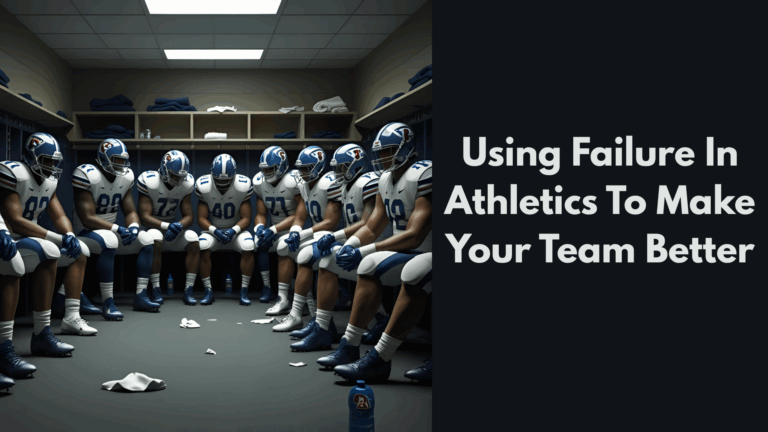
Failure, according to dictionary.com, is defined as “the lack of success” or “the omission of expected or required action.”
I think failure can be a good thing. I think failure is needed.
I want you to think about this for a moment: what is more important to you and or the company/organization that you work for? Is it more important to just get things done, or more important to get things done in a meaningful and authentic way?
Pushing this further: Which team or organization will achieve long-term success: the one that merely goes through the motions, or the one that passionately and diligently strives to do things the right way?
More than a decade ago, I was working at a K-12 private school. One day before we were getting ready to start varsity football practice, I was watching the “tiny ones” getting picked up. I noticed something significant that day which was a part of the culture of the school. The first, second, third grade kids were basically throwing their backpacks to their parents as soon as they saw them. Parents had to pick their kids up at a certain gate. Then, the parents were carrying those backpacks to their cars, FOR their kids.
You might not think that was very significant. But I did. Because I was working with those same kids, they were just older! (I literally was working with some of their older brothers!) The program didn’t win one game the year before I got there. And they were complaining about some of the most simple pieces of fielding a competitive football team. Something as simple as setting up the field was this major “lift” for me to get done. The kids were complaining about setting up our cones, and bags, and putting balls out in the right places for us to start practice.
It hit me that day!
The culture at this school has been for mommy and daddy to carry their backpacks! No wonder I’m having a difficult time getting these kids to do simple tasks. Mommy and daddy have been doing the most simple things for these kids, like carrying their backpacks.
I don’t necessarily fault mom and dad. In their eyes, they were just helping their kids avoid something difficult: carrying their heavy backpacks another 10, 30, 40 yards. Parents were shouldering that burden for their kids because parents never want to see their kids fail.
Recently, I had a small disagreement with my wife along these same lines. Our kids earn an allowance. IF their chores are done by Sunday night at bedtime each of the 4 weeks during a month, we will give them a small amount of money right around the first of each month. Our youngest kid hasn’t been living up to his end of the bargain. And I felt as if my wife was giving him too many “chances.” I told her “the real world don’t work this way, you don’t do your job, you don’t get paid.”
Parents will help their kids to avoid failure at all costs. Have you seen most science projects these days? Ain’t no way THAT second grade kid made THAT volcano! Or has THAT kind of writing. As parents, we have refused to fall into this trap of science fair project at school.
But what does this do for kids? What does it teach our kids when mom and dad won’t let them fail?
What does it do for employees when their bosses don’t hold them accountable to doing their jobs? Will those employees have long term success in their spots, for that organization?
I strongly believe that short time failure can lead to long term success.
More parents need to let their children fail. More bosses needed to let their employees fail. More coaches need to let their players fail.
We can’t keep bailing out our children so they can’t taste failure. We can’t keep bailing out our employees so they don’t know what it is like to fail. And we can’t keep giving our players the easy way out of failure.
In doing so, we aren’t helping them as individuals. And we aren’t helping our organizations.
Here are 4 ways that embracing failure can lead to success.
Learning Opportunities
Failure provides valuable lessons that success often cannot. When things go wrong, it forces individuals and teams to analyze what happened, understand their mistakes, and identify areas for improvement. This process of reflection and learning is crucial for personal and professional growth.
The best and worst year of my Head Coaching life was when we went 0-10 in 2008. It was horrendous, as you can expect! It was far worse than anything that I’ve ever experienced as a Head Coach. Week after week = L. We couldn’t get over the hump of figuring things out. 8 of the 10 teams we played went to the CIF playoffs, and 3 of them won a CIF Championship that year! It was a perfect storm of dwindling school enrollment, mixed with overzealous scheduling 2 years out (by yours truly) mixed with some key season ending injuries. BUT, that year helped our staff to become much, much better. My Defensive Coordinator said a few times that year “This is the best job I’ve ever done coaching but the results don’t show that at all.” We looked only at the results on the scoreboard. This was a common error that season. I had to help our coaches realign our opportunities for growth as both coaches and people.
Building Resilience
One of my favorite parts of being a young dad was watching my kids struggle to get things done. It’s not that I was a jerk! It was that when they finally accomplished something that they had only previously failed at, the look on their faces, and the pride in their achievements were amazing to see.
I remember watching my son Nate trying to make a basket one day, he was 4 or 5. And he was trying to make a basket on a standard 10 foot rim. I absolutely KNEW that he would NOT be able to make that basket. But I let him try about a dozen times. I wanted to watch him struggle to help him build that resiliency in trying hard things.
Experiencing failure helps build resilience and mental toughness. Overcoming setbacks teaches perseverance and adaptability, which are essential traits for long-term success. The ability to bounce back from failure with renewed energy and determination often leads to greater achievements in the future.
Innovation and Creativity
Exactly eight years, one month and 26 days after President Kennedy challenged Americans to reach for the Moon, Project Apollo landed the first humans on the lunar surface and returned them safely to Earth. (Source: NASA.gov) Those eight years were fraught with failure after failure after failure. Imagine the folks at NASA who were not able to get a rocket off the ground on the way to the moon in that first year. Imagine them walking back into the Oval Office and saying “Sorry we didn’t get to the moon Mr. President, we tried.” No, that’s not how it worked! Nearly a decade of failure led to supreme innovation and creativity, and we finally put a man on the moon. I can’t think of many lines of work like our wonderful astronauts and rocket scientists who live in a world of failure.

Failure can be a catalyst for innovation and creativity. When conventional approaches fail, it pushes people to think outside the box and experiment with new ideas. Many groundbreaking innovations have emerged from the willingness to take risks and learn from failed attempts.
Cultivating a Growth Mindset
My favorite baseball player is Mr. Padre, Tony Gwynn! His lifetime batting average was .338. This means that his failure rate was .662! Think of that: one of the best hitters to play the game of baseball had a failure rate of .662, nearly twice that of this success rate. Wild!

Baseball players and professional golfers are two of the groups of athletes who live in a world of failure. If you want to be a great baseball player or golfer, and can’t deal with living in the world of failure, you won’t have a very long career.
One of the only ways to overcome failure is with your mind. Your mind needs to be stronger than the effects of failing in order to help you to persevere so that you can grow.
Embracing failure fosters a growth mindset, where challenges are seen as opportunities to grow rather than insurmountable obstacles. This mindset encourages continuous learning and improvement, leading to sustained success over time. Individuals and organizations with a growth mindset are more likely to embrace change, seek feedback, and strive for excellence.
The next time that you are tempted to save a coworker from failure, or to rescue your kid from a failing grade, or get your team out of trouble so they don’t experience failure, think hard to yourself “Am I really helping them?” You probably aren’t.
Embrace failure!
Chris Fore has his Masters degree in Athletic Administration, is a Certified Athletic Administrator and served for 3 years as the President of the California Coaches Association. He coached high school football for 17 years, including 8 years as a Head Coach. He is also a court-certified Expert Witness in athletically based court cases. Fore is the CEO of Eight Laces Consulting which specializes in helping coaches nationwide in their job search process, and provides dynamite resources for coaches. Fore has been named to the Hudl Top 100 Coaches, and the Top 5 Best High School Football Coaches to follow on Twitter by MaxPreps. Follow him!


